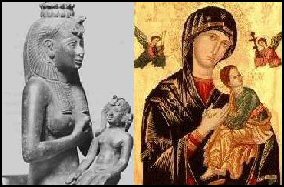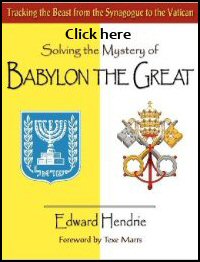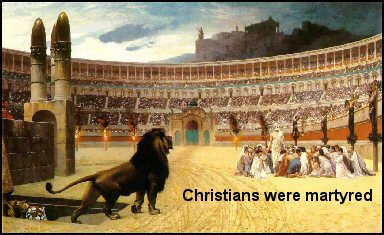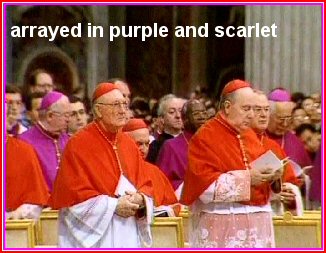When the Bible
uses symbolic language, a "woman" can symbolize a church.
The true church, for example, is likened to a bride, a chaste
virgin, a woman without spot or blemish (Eph. 5:27: Rev.
19:7,8). But here, in striking contrast, an unclean woman, a
defiled woman, a harlot, is pictured. If it is here correct
to apply this symbolism to a church system, it is clear that only
a defiled and Fallen church could be meant! In big capital
letters, the Bible calls her "MYSTERY
BABYLON."
When John wrote
the book of Revelation, Babylon--as a city and empire--had already
been destroyed and left in ruins, as the Old Testament prophets
had foretold (Isaiah 13: 19-22; Jer. 51-52). But the
religious concepts and customs that originated in Babylon
continued on and were well represented in many nations of the
world. Just what was the religion of ancient Babylon? How
did it all begin? What significance does it hold in modern
times? How does it all tie in with what John wrote in the
book of Revelation?
Turning the
pages of time back to the period shortly after the flood, men
began to migrate from the east, "and it came to pass, as they
Journeyed from the east, that they found a plain in the land of
Shinar; and they dwelt there" (Gen. I I :2). It was here
that the city of Babylon was built and this land became known as
Babylonia or later as Mesopotamia.
Here the
Euphrates and Tigris rivers had built up rich deposits of earth
that could produce crops in abundance. But there were
certain problems the people faced. For one thing, the land
was overrun with wild animals which were a constant threat to the
safety and peace of the inhabitants (Exodus 23:29,30). Obviously
anyone who could successfully provide protection from these wild
beasts would receive great acclaim from the people.
It was at this
point that a large, powerfully-built man by the name of Nimrod
appeared on the scene. He became famous as a mighty hunter
against the wild animals. The Bible tells us: "And Cush
begat Nimrod: he began to be a mighty one in the earth. He
was a mighty hunter before the Lord: wherefore it is said, Even as
Nimrod the mighty hunter before the Lord" (Gen. l0:8-9).
Apparently
Nimrod's success as a mighty hunter caused him to become famous
among those primitive people. He became "a mighty one" in
the earth--a famous leader in worldly affairs. Gaining this
prestige, he devised a better means of protection. Instead
of constantly fighting the wild beasts, why not organize the
people into cities and surround them with walls of
protection? Then, why not organize these cities into a
kingdom? Evidently this was the thinking of Nimrod, for the
Bible tells us that he organized such a kingdom. "And the
beginning of his KINGDOM was Babel, and Erech, and Accad, and
Calneh, in the land of Shinar' (Gen. l0: 10). The kingdom of
Nimrod is the first mentioned in the Bible.
Whatever advances may have been made by Nimrod
would have been well and good, but Nimrod was an ungodly
ruler. The name Nimrod comes from marad. meaning, "he
rebelled." The expression that he was a mighty one "before
the Lord" can carry a hostile meaning the word "before" being
sometimes used as meaning "against" the Lord. The Jewish
Encyclopedia that Nimrod was "he who made all the people
rebellious against God."
The noted historian Josephus wrote: "Now it was
Nimrod who excited them to such an affront and contempt of
God....He also gradually changed the government into tyranny,
seeing no other way of turning men from the fear of God..,the
multitudes were very ready to follow the determination of
Nimrod...and they built a tower, neither sparing any pains, nor
being in any degree negligent about the work: and, by reason of
the multitude of hands employed in it, it grew very high....The
place wherein they built the tower is now called Babylon."

Basing his conclusions on information that has
come down to us in history, legend, and mythology, Alexander
Hislop has written in detail of how Babylonian religion developed
around traditions concerning Nimrod, his wife Semiramis, and her
child Tammuz. When Nimrod died, according to the old
stories, his body was cut into pieces, burnt, and sent to various
areas. Similar practices are mentioned in the Bible (Judges
19:29: 1 Sam. 11:7).
Following his death, which was greatly mourned
by the people of Babylon, his wife Semiramis claimed he was
now the
sun god.
Later, when she gave birth to a son, she claimed that her son
Tammuz by name, was their hero Nimrod reborn.
The mother of Tammuz had probably heard the
prophecy of the coming Messiah to be born of a woman, for this
truth was known from the earliest times (Gen. 3:15). She
claimed her son was supernaturally conceived and that he was the
promised seed, the "savior." In the religion that developed,
however, not only was the
child worshiped, but the mother
was worshiped also!
Much of the Babylonian worship was carried on
through mysterious symbols--it was a "mystery" religion.
Since the deified Nimrod was believed to be the
sun god, fire was considered
his earthly representation. Thus, as we shall see, candles
and ritual fires were lighted in his honor. In other forms,
he was symbolized by
sun images,
fish, trees, pillars,
and animals.
Centuries later, Paul gave a description which
perfectly fits the course that the people of Babylon followed:
"When they knew God, they glorified him not as God...but became
vain in their imaginations, and their foolish heart was
darkened. Professing themselves to be wise, they became
fools, and changed the glory of the uncorruptible God into an
image made like to corruptible man, and to birds, and fourfooted
beasts, and creeping things...they changed the truth of God into a
lie, and worshiped and served the creature more than the
creator...for this cause God gave them up unto vile affections"
(Rom. 1:21-26).
Rom 1:21 Because that, when they knew
God, they glorified him not as God, neither were thankful; but
became vain in their imaginations, and their foolish heart was
darkened.
Rom 1:22 Professing themselves to be wise, they became
fools,
Rom 1:23 And changed the glory of the uncorruptible God
into an image made like to corruptible man, and to birds, and
fourfooted beasts, and creeping things.
Rom 1:24 Wherefore God also gave them up to uncleanness
through the lusts of their own hearts, to dishonour their own
bodies between themselves:
Rom 1:25 Who changed the truth of God into a lie, and
worshipped and served the creature more than the Creator, who is
blessed for ever. Amen.
Rom 1:26 For this cause God gave them up unto vile
affections: for even their women did change the natural use into
that which is against nature:
This system of idolatry spread from Babylon to
the nations, for it was from this location that men were scattered
over the face of the earth (Gen. 11:9). As they went from
Babylon, they took their worship of the mother and child, and the
various mystery symbols with them. Herodotus, the world
traveler and historian of antiquity, witnessed the mystery
religion and its rites in numerous countries and mentions how
Babylon was the primeval source from which all systems of idolatry
flowed. Bunsen says that the religious system of Egypt was
derived from Asia and "the primitive empire in Babel." In
his noted word Nineveh and its Remains, Layard declares that we
have the united testimony of sacred and profane history that
idolatry originated in the area of Babylonia--the most ancient of
religious systems. All of these historians were quoted by
Hislop.
When Rome became a world empire, it is a known
fact that she assimilated in to her system the gods and religions
from the various
sun worship
countries over which she ruled. Since Babylon was the source
of the
sun worship of
these countries, we can see how the early religion of
sun worshiping Rome was but
the Babylonish worship that had developed into various forms and
under different names in the counties to which it had gone.
Bearing this in mind, we notice that it was
during the time while Rome was ruling the world that the true
savior, Jesus Christ, was born, lived among men, died, and rose
again. He ascended into heaven, sent back the Holy Spirit,
and the New Testament church was established in the earth.
What glorious days! One only has to read the book of Acts to
see how much God blessed his people in those days.
Multitudes were added to the church. Great signs and wonders
were performed as God confirmed his word with signs following.
Christianity, anointed by the Holy Spirit,
swept the world like a prairie fire. It encircled the
mountains and crossed the oceans. It made kings to tremble
and tyrants to fear. It was said of those early Christians
that they had "turned the world upside down"!--so powerful
was their message and spirit (Acts 17:6)
Act 17:6 And when they found them not,
they drew Jason and certain brethren unto the rulers of the
city, crying, These that have turned the world upside down are
come hither also;
Act 17:7 Whom Jason hath received: and these all do
contrary to the decrees of Caesar, saying that there is another
king, one Jesus.
Before too may years had passed, however, men
began to set themselves up as "lords" over God's people in place
of the Holy Spirit. Instead of conquering by spiritual means
and by truth--as in the early days--men began to substitute their
ideas and their methods. Attempts to merge
sun worship in Christianity
were being made even in the days when our New Testament was being
written, for Paul mentioned that the "mystery of iniquity" was
already at work; he warned that there would come a "falling away"
and some would "depart from the faith, giving heed to seducing
spirits and doctrines of devils"--the counterfeit doctrines of the
sun worshipers (2Thess.
2:3-7: 1 Tim. 4:2).
2Th 2:3 Let no man deceive you by any
means: for that day shall not come, except there come a falling
away first, and that man of sin be revealed, the son of
perdition;
2Th 2:4 Who opposeth and exalteth himself above all that
is called God, or that is worshipped; so that he as God sitteth
in the temple of God, shewing himself that he is God.
2Th 2:5 Remember ye not, that, when I was yet with you, I
told you these things?
2Th 2:6 And now ye know what withholdeth that he might be
revealed in his time.
2Th 2:7 For the mystery of iniquity doth already work:
only he who now letteth will let, until he be taken out of the
way.
1Ti 4:1 Now the Spirit speaketh expressly, that in the
latter times some shall depart from the faith, giving heed to
seducing spirits, and doctrines of devils;
1Ti 4:2 Speaking lies in hypocrisy; having their
conscience seared with a hot iron;
1Ti 4:3 Forbidding to marry, and commanding to abstain
from meats, which God hath created to be received with
thanksgiving of them which believe and know the truth.
By the time that Jude wrote the book that bears
his name, it was necessary for him to exhort the people to
"earnestly contend for the faith that was once delivered unto the
saints," for certain men had crept in who were attempting to
substitute things that were no part of the original faith (Jude
1:3-4)
Jude 1:3 Beloved, when I gave all
diligence to write unto you of the common salvation, it was
needful for me to write unto you, and exhort you that ye
should earnestly contend for the faith which was once
delivered unto the saints.
Jude 1:4 For there are certain men crept in unawares,
who were before of old ordained to this condemnation, ungodly
men, turning the grace of our God into lasciviousness, and
denying the only Lord God, and our Lord Jesus Christ.

Christianity came
face to face with the Babylonia
sun
worship in its various forms that had been established in
the Roman Empire. The early Christians
refused to have anything to
do with its customs and beliefs.
Much persecution resulted.
Many Christians were falsely accused, thrown to the lions burned
at the stake , and in other ways tortured and martyred. Then
great changes began to be made. The emperor of Rome
professed conversion to Christianity. Imperial orders went
forth throughout the empire that persecution should cease.
Bishops were given high

honors. The church began to receive worldly recognition and
power. But for all of this, a great price had to be
paid! Many compromises were made with
sun worship. Instead of
the church being separate from the world,
it
became a part of this world
system. The emperor showing favor,
demanded a place of leadership in the church: for in
Sun worship, emperors were
believe to be gods. From here on, wholesale mixtures of
sun worship into the
Christianity were made,
especially at Rome.
History proves it was this mixture that produced the system which
is
known today as the Roman
Catholic church. Lets not doubt that there are many
fine, sincere, and devout Catholics. It is not our intention
to treat lightly or to ridicule anyone whose beliefs we may here
disagree with. But that history will inspire all--regardless
of their religious affiliation--to forsake Babylonish doctrines
and seek a return to the faith that was once delivered unto the
saints.
The penetration of the Religion of
Babylon became so general and well known that Rome was
called the
"New Babylon." Faith of our fathers 1917 ed.
Cardinal Gibbons, p. 106 Understand this is a quote from
a
Roman Catholic Cardinal.
“Signs and symbols rule the Sun Worship world, not
words nor laws.”
www.granddesignexposed.com



 honors. The church began to receive worldly recognition and
power. But for all of this, a great price had to be
paid! Many compromises were made with
honors. The church began to receive worldly recognition and
power. But for all of this, a great price had to be
paid! Many compromises were made with